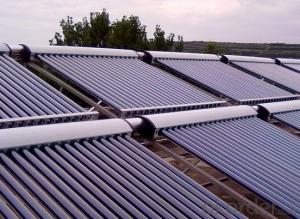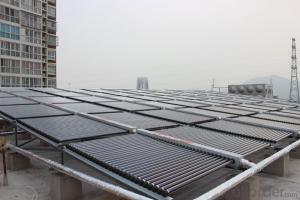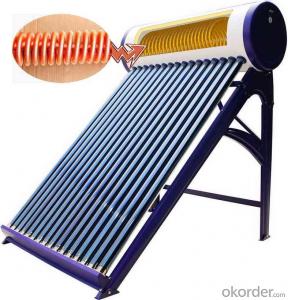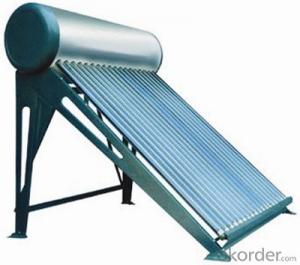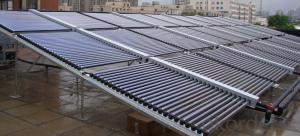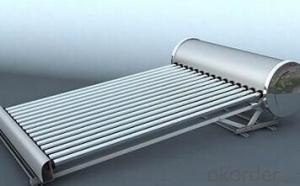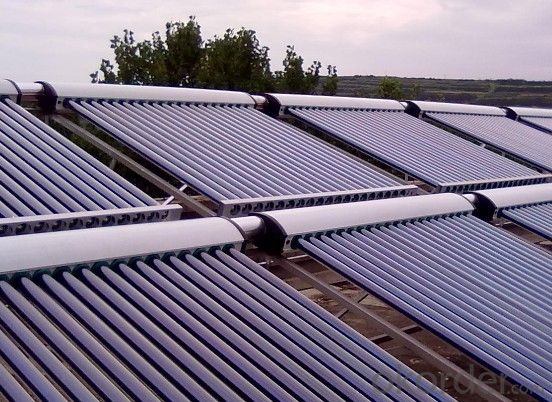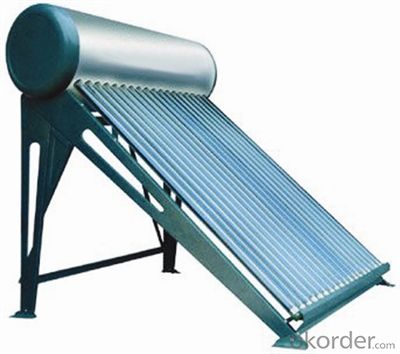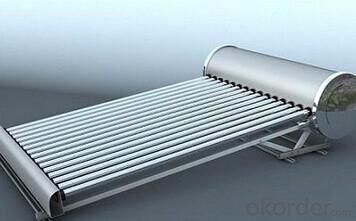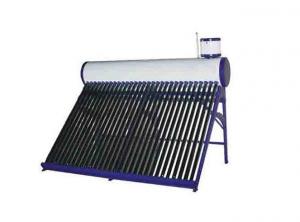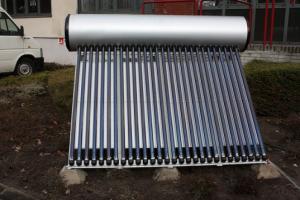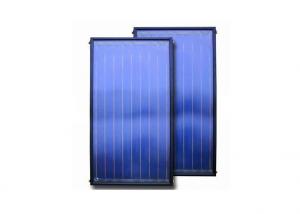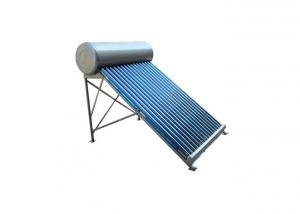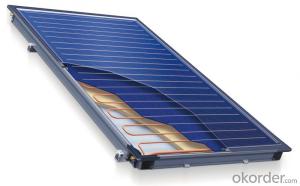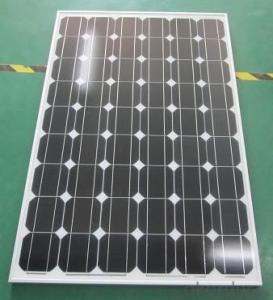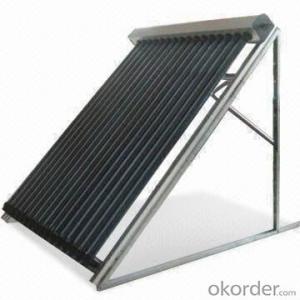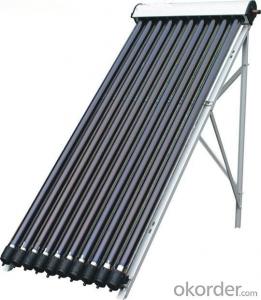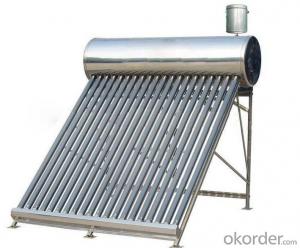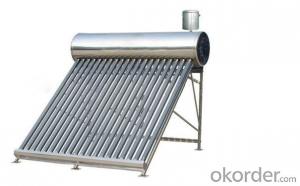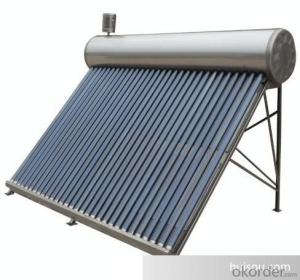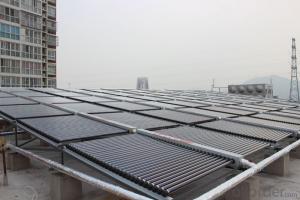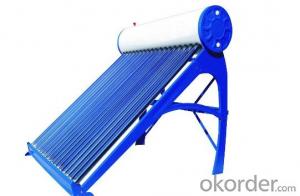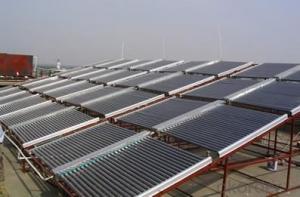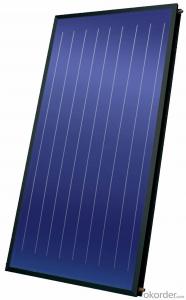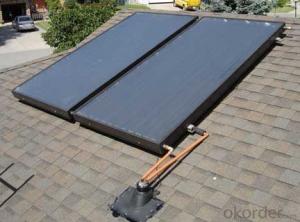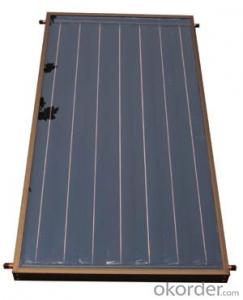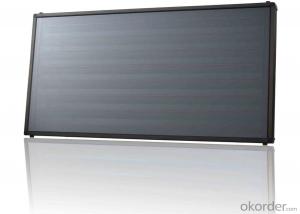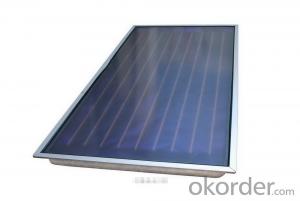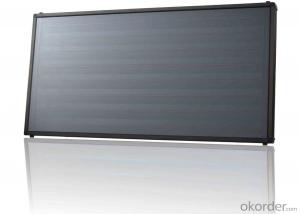Alpine TX Solar Collectors Copper Heat Pipe Solar Water Heater System
- Loading Port:
- China main port
- Payment Terms:
- TT OR LC
- Min Order Qty:
- 1 set
- Supply Capability:
- 6000 set/month
OKorder Service Pledge
OKorder Financial Service
You Might Also Like
Introduction of Non-Pressure Solar Water Heater:
Non-pressure Solar Heater is one of the most economical solar water heating device with pretty high efficiency at the same time. It consists of hot water storage tank, solar vacuum tubes with mouth plug in storage tank, and bracket supporting tank and tubes.When cold water in evacuated tubes is heated with solar irradiation, as the specific gravities of hot water and cold water are different, hotter water goes upward to storage tank and colder water goes downward to glass tubes. through this continuous circulation, the cold water in storage tank will be gradually heated till sunset.
Specialty:
1. High thermal performance and working temperature: the heat exchanging rate even in winter can up above 55%.
2. Heat collecting efficiency is at least 20% above common solar systems.
3. Work in all day and all season: no matter any corner of the world, this system can work well even -40℃ to avoid the tube freezing problem.
4. Reliability: No water following through the tube, so water scale can not generate and tube cracks could be avoided, the system still can keep working even with some damaged tubes.
5. It can connect with water tap and work automatically with pressure0.6Mpa, bring enjoyable washing experience.
6. Safety: P/T valve would release pressure and temperature to protect tank..
Technical Specification:
1. Outer tank material: SUS304 stainless steel or powder coated color steel
2. Inner tank material: 1.2mm thick SUS304 food grade stainless steel ( Optional material SUS316L)
3. Vacuum tube material: borosilicate glass 3.3; AL-SS-CU absorb coating, with copper heat pipe inside
4. Frame material: 1.2mm thickness stainless steel
5. Insulation material: 55mm thickness polyurethane
6. Suitable for mains pressure water(up to 8 bar/116psi)
7. Easy plug-in installation
8. Install the T/P valve on the pressurized tank
9. Seal material: Stabilized High Temperature Silicon
Outer tank material: SUS304 stainless steel or powder coated color steel
Inner tank material: 1.2mm thick SUS304 food grade stainless steel ( Optional material SUS316L)
Vacuum tube material: borosilicate glass 3.3; AL-SS-CU absorb coating, with copper heat pipe inside
Frame material: 1.2mm thickness stainless steel
Insulation material: 55mm thickness polyurethane
Suitable for mains pressure water(up to 8 bar/116psi)
Easy plug-in installation
Install the T/P valve on the pressurized tank
Seal material: Stabilized High Temperature Silicon
19. Vacuum Tube | 20. Size (mm) | 21. Φ47*1500 / Φ58*1800 / Φ70*2100 | |||||
22. Tube (pcs) | 23. 10 / 12 / 15 / 18 / 20 / 22 / 24 / 30 / 36 / 42 | ||||||
24. Material | 25. Borosilicate 3.3 glass, magnetron spluttering selective coating | ||||||
26. Coating | 27. Single-target AL-N/AL or Three-target AL/N-Cu-SS | ||||||
28. Water Tank | 29. Capacity | 30. 80L ~ 500L for hot water storage tank | |||||
31. Inner tank | 32. Food-grade stainless steel SUS304-2B / SUS316 | ||||||
33. Insulation | 34. High-density polyurethane foam with 70~80 hour heat preservation | ||||||
35. Tank shell | 36. Food-grade stainless steel SUS304-2B | ||||||
37. Bracket | 38. Shaped strong aluminum alloy structure adaptable for flat or slope roof | ||||||
39. Accessories | 40. Anti-aging silicon seals, Dustproof seals, Air-vent cap, Stainless screws | ||||||
41. Auxiliary Devices | 42. Assistant tank, Intelligent controller, Electrical heater, Magnesium anodes | ||||||
43. Tilt Angle | 44. 25 ~ 50° | ||||||
45. Water Output | 46. 45 - 95°C | ||||||
47. Hail Resistance | 48. Φ25mm diameter | ||||||
49. Model Number | 50. Solar Vacuum Tube | 51. Tank 52. Liter | 53. System 54. Liter | 55. Container Loading Qty /sets | |||
56. Size /mm | 57. Qty /pcs | 58. 20GP | 59. 40GP | 60. 40HQ | |||
61. VNS-58SA12-100 | 62. Φ58*1800 | 63. 12 | 64. 100 | 65. 132 | 66. 58 | 67. 119 | 68. 140 |
69. VNS-58SA15-130 | 70. 15 | 71. 130 | 72. 170 | 73. 54 | 74. 108 | 75. 131 | |
76. VNS-58SA18-150 | 77. 18 | 78. 150 | 79. 198 | 80. 43 | 81. 86 | 82. 105 | |
83. VNS-58SA20-170 | 84. 20 | 85. 170 | 86. 223 | 87. 40 | 88. 80 | 89. 97 | |
VNS-58SA24-200 | 24 | 200 | 263 | 35 | 70 | 85 | |
VNS-58SA30-250 | 30 | 250 | 329 | 28 | 56 | 68 | |
VNS-58SA36-300 | 36 | 300 | 395 | 23 | 47 | 57 | |
Product Show
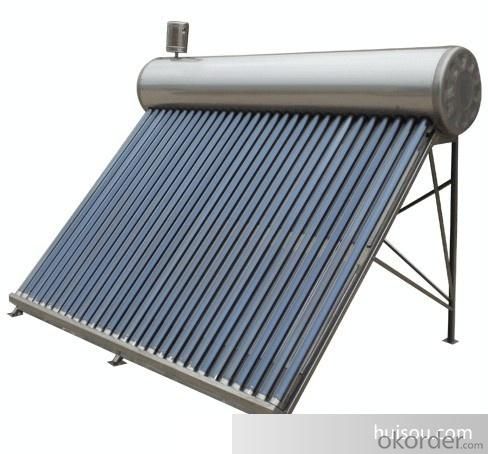
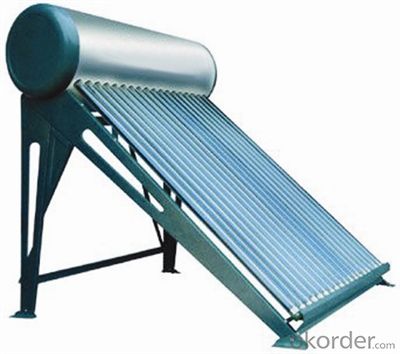
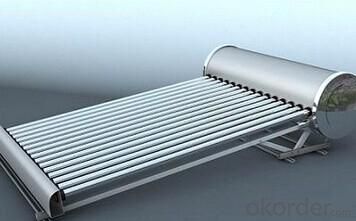
Our Services
1. OEM service
2. Warranty: 5 years
3. Considerable after sale service
Color steel Compact pressure Thermal solar heater
FAQ:
1. What’s the delivery time?
10 days after receiving deposit.
2. How long is the warranty?
5 years for whole system, 1 year for accessory
3. What’s your production capacity?
6000sets/month
4. What’s the MOQ?
1 set.
5. What’s your payment term?
Container: 30% T/T in advance for deposit, 70% T/T before shipment for fist order.
70% T/T after seeing copy of B/L from second order
Sample: 100% T/T in advance
Other choices: L/C at sight.
6. What certifications do you have?
CE, SOLAR KEYMARK, SRCC and etc.
- Q: Can solar collectors be used in areas with limited access to storage solutions?
- Yes, solar collectors can be used in areas with limited access to storage solutions. In such cases, the solar energy generated by the collectors can be utilized directly for immediate use, such as heating water or powering appliances, without the need for storage. This can be particularly useful in locations where storage infrastructure is limited or not feasible, allowing for efficient utilization of solar energy without the need for additional equipment.
- Q: Are there any limitations on the slope or angle of solar collectors?
- Yes, there are limitations on the slope or angle of solar collectors. The optimal slope or angle of solar collectors depends on various factors such as the latitude of the location, climate conditions, and the specific purpose of the solar system. Generally, the optimal angle is the one that maximizes solar energy absorption and varies between regions. However, collectors should not be installed at extreme slopes or angles as it may affect the efficiency and performance of the system.
- Q: Are there any financial benefits to installing solar collectors?
- Yes, there are several financial benefits to installing solar collectors. Firstly, solar collectors can significantly reduce or even eliminate monthly electricity bills by generating free and renewable energy from the sun. Additionally, homeowners who install solar collectors may be eligible for various government incentives, such as tax credits or rebates, which can help offset the initial installation costs. Moreover, if the solar collectors produce more energy than is consumed, the excess can be sold back to the grid, allowing homeowners to earn credits or even receive payments from their utility company. Overall, installing solar collectors can lead to long-term savings, increased property value, and a return on investment over time.
- Q: Can solar collectors be used in residential homes?
- Yes, solar collectors can indeed be used in residential homes. In fact, they are increasingly being adopted as a sustainable and cost-effective solution for generating renewable energy at the residential level. Solar collectors, such as photovoltaic panels or solar water heaters, are installed on rooftops or in open spaces to harness the power of the sun and convert it into electricity or heat, respectively. This allows homeowners to reduce their dependence on traditional energy sources and lower their carbon footprint, while also potentially saving money on utility bills.
- Q: Are there any government incentives or subsidies available for solar collectors?
- Yes, there are government incentives and subsidies available for solar collectors. These incentives vary by country and region, but they typically include tax credits, grants, rebates, and low-interest loans. These initiatives aim to promote the adoption of renewable energy sources and reduce greenhouse gas emissions.
- Q: Are there any noise concerns with solar collectors?
- No, solar collectors do not produce any noise and are completely silent in operation.
- Q: Can solar collectors be used for agricultural applications?
- Yes, solar collectors can be used for agricultural applications. They can be used to power irrigation systems, provide electricity for farm operations, and help in heating greenhouses. Additionally, solar collectors can be utilized to generate heat for drying crops and heating water for livestock.
- Q: Can solar collectors be used for heating indoor spaces?
- Yes, solar collectors can be used for heating indoor spaces. Solar collectors, such as solar thermal systems or solar air heaters, can capture sunlight and convert it into heat energy. This heat can then be utilized to warm indoor spaces, providing a sustainable and energy-efficient heating solution.
- Q: Are solar collectors suitable for countries with limited sunlight?
- Despite the limited sunlight in certain countries, solar collectors remain a viable option. Although their efficiency may be reduced compared to countries with abundant sunlight, solar collectors are able to convert sunlight into usable energy. It is worth noting that even in countries with limited sunlight, there is still some level of solar radiation available throughout the year. In countries with limited sunlight, it is crucial to consider the type and design of solar collectors used. For example, opting for solar thermal collectors that prioritize capturing heat rather than generating electricity can be more advantageous in such regions. These collectors can be utilized for heating water or space heating, which are significant energy demands even in countries with limited sunlight. Moreover, advancements in solar technology have resulted in the creation of more efficient solar collectors that can generate energy even in low-light conditions. For instance, some solar panels are specifically designed to capture diffuse light, making them suitable for regions with limited direct sunlight. Furthermore, the integration of solar collectors with other renewable energy sources, such as wind or hydro power, can help compensate for the limited sunlight and ensure a more reliable and sustainable energy supply. Therefore, while solar collectors may not be as efficient in countries with limited sunlight, they can still serve as a viable and valuable renewable energy option, especially when combined with other renewable sources and optimized for the specific conditions of the region.
- Q: Can solar collectors be used in areas with limited access to materials?
- Yes, solar collectors can be used in areas with limited access to materials. Solar collectors primarily consist of glass, metal, and plastic components that can be sourced locally or through alternative means. Additionally, simple and low-cost solar collector designs can be employed using locally available materials like wood, aluminum foil, or even recycled materials, making it feasible to utilize solar energy in areas with limited access to specific resources.
Send your message to us
Alpine TX Solar Collectors Copper Heat Pipe Solar Water Heater System
- Loading Port:
- China main port
- Payment Terms:
- TT OR LC
- Min Order Qty:
- 1 set
- Supply Capability:
- 6000 set/month
OKorder Service Pledge
OKorder Financial Service
Similar products
Hot products
Hot Searches
Related keywords
